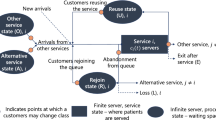Summary
The principle of Minimum Relative Entropy (MRE), given fully decomposable subset and aggregate mean queue length, utilisation and flow-balance constraints, is used in conjunction with asymptotic connections to infinite capacity queues, to derive new analytic approximations for the conditional and marginal state probabilities of single class general closed queueing network models (QNMs) in the context of a multilevel variable aggregation scheme. The concept of subparallelism is applied to preserve the flow conservation and a universal MRE hierarchical decomposition algorithm is proposed for the approximate analysis of arbitrary closed queueing networks with single server queues and general service-times. Heuristic criteria towards an optimal coupling of network's units at each level of aggregation are suggested. As an illustration, the MRE algorithm is implemented iteratively by using the Generalised Exponential (GE) distributional model to approximate the service and asymptotic flow processes in the network. This algorithm captures the exact solution of separable queueing networks, while for general queueing networks it compares favourably against exact solutions and known approximations.
Similar content being viewed by others
References
Baskett, F., Chandy, K.M., Muntz, R.R., Plasios, F.G.: Open, closed and mixed networks of queues with different classes of customers, JACM22(2), 248–260 (1975)
Courtois, P.J.: Decomposability, instabilities and saturation in multiprogramming systems. Commun. ACM18(7), 371–377 (1975)
Chandy, K.M., Herzog, U., Woo, L.: Approximate analysis of general queueing networks. IBM J. Res. Dev.19, 50–57 (1975)
Sevcik, K.C., Levy, A.I., Tripathi, S.K., Zahorjan, J.L.: Improving approximations of aggregated queueing network subsystems. Comp. Perf., Chandy, K.M., Reiser, M. (eds.) Amsterdam: North-Holland 1977
Marie, R.A.: An approximate analytical method for general queueing networks. IEEE Trans. Software Eng.SE-5, 530–538 (1979)
Kouvatsos, D.D.: A universal maximum entropy algorithm for the analysis of general closed networks. Hasegawa, T., et al. (eds.) Comparative networking and perfect evaluation, pp. 113–123. Amsterdam: North-Holland 1986
Courtois, P.J.: Decomposability, queueing and computer systems applications. London: Academic Press 1977
Simon, H.A., Ando, A.: Aggregation of variables in dynamic systems. Econometrica29(2), 111–138 (1961)
Balsamo, S.: Decomposability in general Markovian networks, Math. Comp. Perf. and Reliability, Jazeolla, G., Courtois, P.J., Hordwijk, A. (eds.). Amsterdam: Elsevier Science 1984
Vantilborgh, H.: Exact aggregation in exponential queueing networks. ACM J.24(4), 620–629 (1978)
Balsamo, S., Iazeolla, G.: An extension of Norton's Theorem for queueing networks. IEEE Trans. Software Eng.SE-8, 298–305 (1982)
Shore, J.E., Johnson, R.W.: Properties of cross-entropy minimization, IEEE Trans. Inf. TheoryIT-27(5), 472–482 (1981)
Shore, J.E.: Cross-entropy minimization given fully decomposable subset and aggreagate constraints, IEEE Trans. Inf. TheoryIT-28(6), 956–961 (1982)
Shore, J.E.: Private communication 1983
Kouvatsos, D.D.: Maximum entropy and theG/G/1N queue. Acta Inf.23, 545–565 (1986)
Tomaras, P.J.: Decomposition of general queueing network models. PhD Thesis, University of Bradford, 1989
Kouvatsos, D.D., Tomaras, P.J.: A minimum relative entropy hierarchical decomposition of central server models. Research Report DDK/PJT/1, Comp. Syst. Modelling Res. Group, Univ. Bradford, 1988
Kuehn, P.J.: Approximate analysis of general queueing networks by decomposition, IEEE Trans. Commun.COM-27, 113–126 (1979)
Almond, J.: Generalized analytic queueing network models. PhD Thesis, University of Bradford 1988
Marsan, M.A., Conte, G., Balbo, G.: A class of generalised stochastic petri nets for the performance evaluation of multi-processor systems. ACM Trans. Comput. Systems2, 93–122 (1984)
Neuse, D., Chandy, K.M.: HAM: The heuristic aggregation method for solving general closed queueing network models of computer systems. Performance Eval. Rev.4, 195–212 (1982)
Shum, A.W.: Queueing models for computer systems with general service time distributions, PhD Thesis, Harvard University 1976
Tripathi, S.K.: On approximate solution techniques for queueing network models of computer systems, PhD Thesis, Toronto University 1979
Walstra, R.: Iterative analysis of networks of queues. PhD Thesis, Toronto University 1984
Author information
Authors and Affiliations
Additional information
This work is sponsored by the Science and Engineering Research Council (SERC), UK, under grant GR/F29271
Rights and permissions
About this article
Cite this article
Tomaras, P.J., Kouvatsos, D.D. MRE hierarchical decomposition of general queueing network models. Acta Informatica 28, 265–295 (1991). https://doi.org/10.1007/BF01178507
Received:
Issue Date:
DOI: https://doi.org/10.1007/BF01178507




